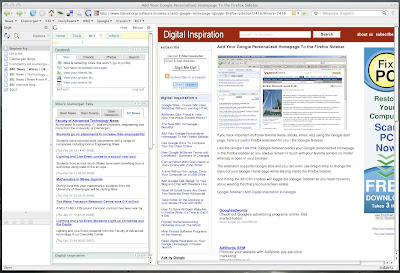
When I first heard of Twitter I was less than complementary in my judgement.
I think I was wrong.
When I noticed that Twitter was integrated within Flock, I was persuaded to try again.
At first I twittered from my Mac Book, yesterday I twittered using my mobile phone.
Wikipedia tells us that Twitter is is a
"free social networking and micro-blogging service that allows users to send "updates" (or "tweets"; text-based posts, up to 140 characters long) to the Twitter website, via short message service, instant messaging, or a third-party applications"furthermore;
"Updates are displayed on the user's profile page and instantly delivered to other users who have signed up to receive them. The sender can restrict delivery to those in his or her circle of friends (delivery to everyone is the default). Users can receive updates via the Twitter website, instant messaging, SMS, RSS, email or through an application."I'm not certain I'll use it often, I don't need to be so connected; but there are people for whom such connectivity must be important.
I explored and searched for interesting tweets and on finding that Cardiff University was offering news tweets, I became a follower.
Encouraged and made curious by a note from Tweet, I observed that Hillary Clinton and Barack Obama are using Twitter. I don't suppose they do their own Twittering, their staff must do it for them; but I could be wrong.
Here are Barack's last three Twitters.
Feb. 21. Excited to learn about winning the Dems Abroad primary today. Getting ready for the Texas debate. It will be live tonight at 8pm ET on CNN.and here are Hillary's
Feb. 19. Is encouraging everyone to tell friends in Wisconsin to vote until 8pm tonight. And tell friends in Hawaii to get to their caucus by 6:30pm!
Feb. 12. Encouraging everyone in DC, MD and VA to vote today. Heading to Madison, WI for a Rally for Change event at the Kohl Center (6:15pm tonight)
Feb. 28. I’m looking forward to the “Solutions for America” town hall in Hanging Rock, OH tomorrow in the Appalachian region.Is it me or is there a difference in style between these two twitterers?
Feb. 27. Want to help win in Ohio, Rhode Island, Texas and Vermont? Visit www.hillaryclinton.com/twit... to start making calls!
Feb.27. Today I’m attending an Economic Solutions Summit in Zanesville, Ohio followed by rallies in Saint Clairsville and Belpre.
Is it possible to notice a diffference of style in only 140 characters?
Hillary's stats reveal that today she has 1,436 followers and has made 51 updates.
She's following no one.
Barack's stats reveal that today he has 6,661 followers and has made 73 updates.
He's following 6,793 twitterers, of whom I am one!!
Presumably if I Twitter about him, one of his staff will notice.
It seems that Hillary doesn't care about what I might say.
Ron Paul can also be found in Twitter.
His stats reveal 1,011 followers and 85 updates.
Like Hillary he's following no one.
Might we be able to predict who will win this seemingly never ending selection process by counting twits?
Blogged with Flock

